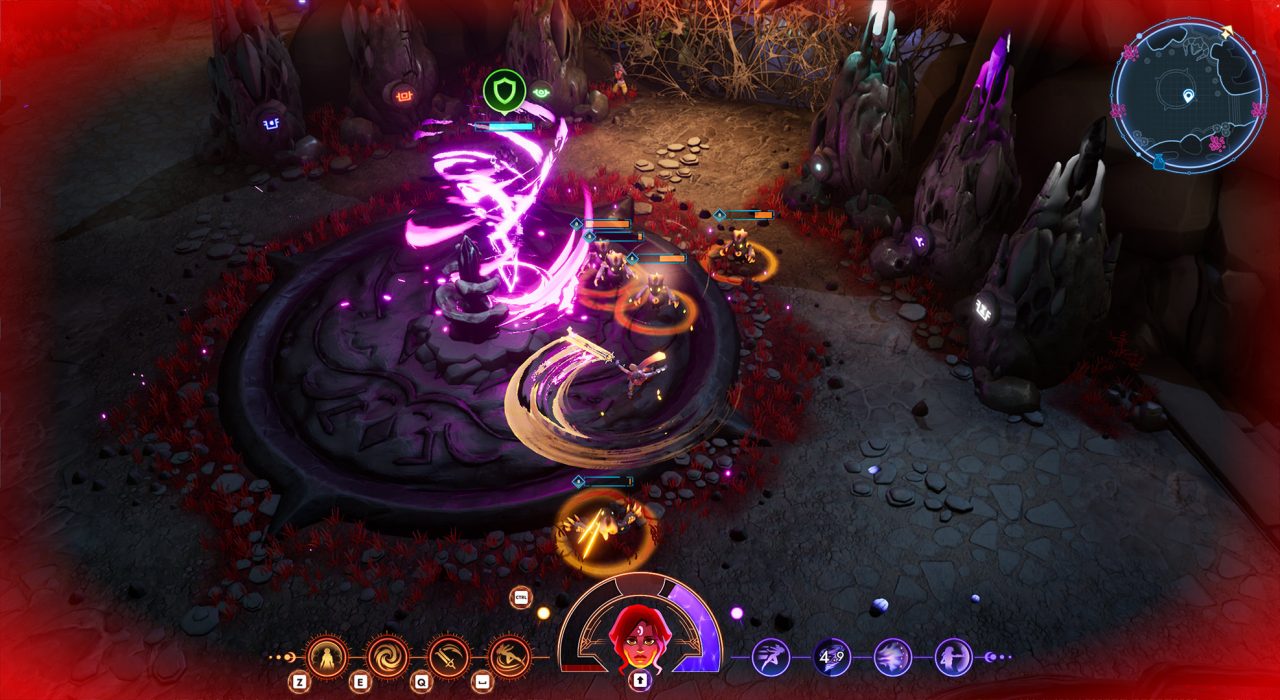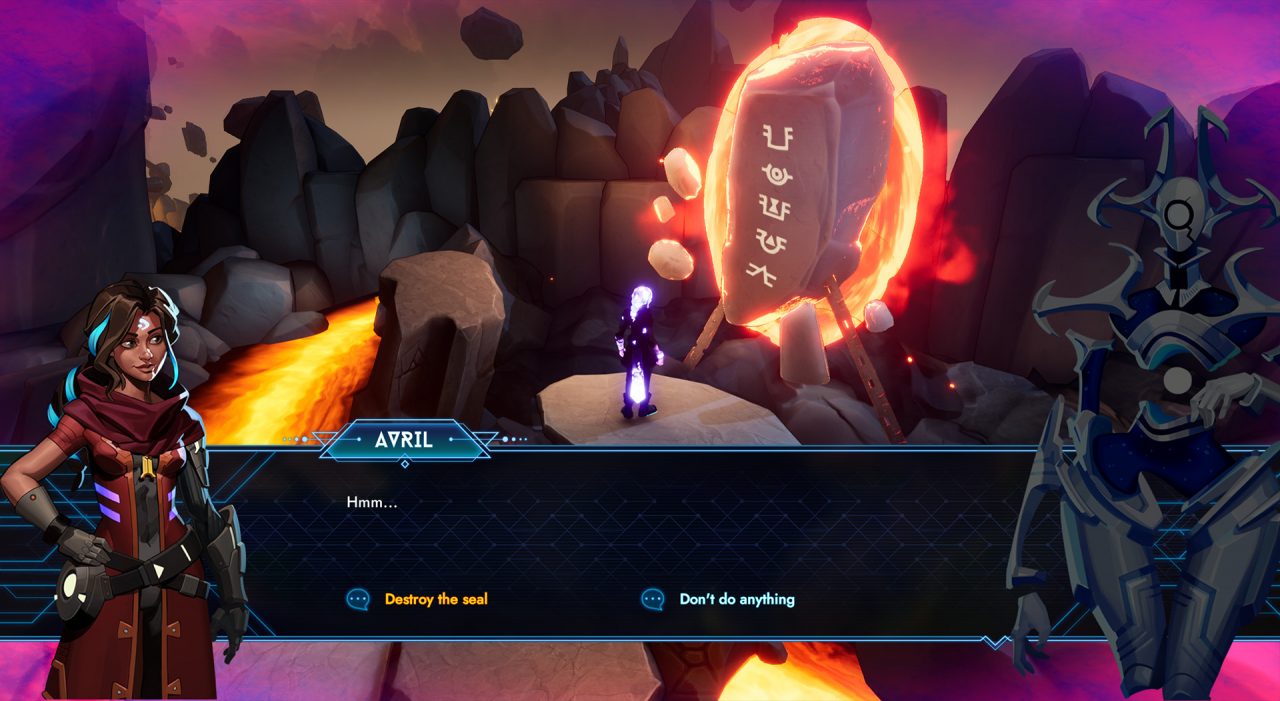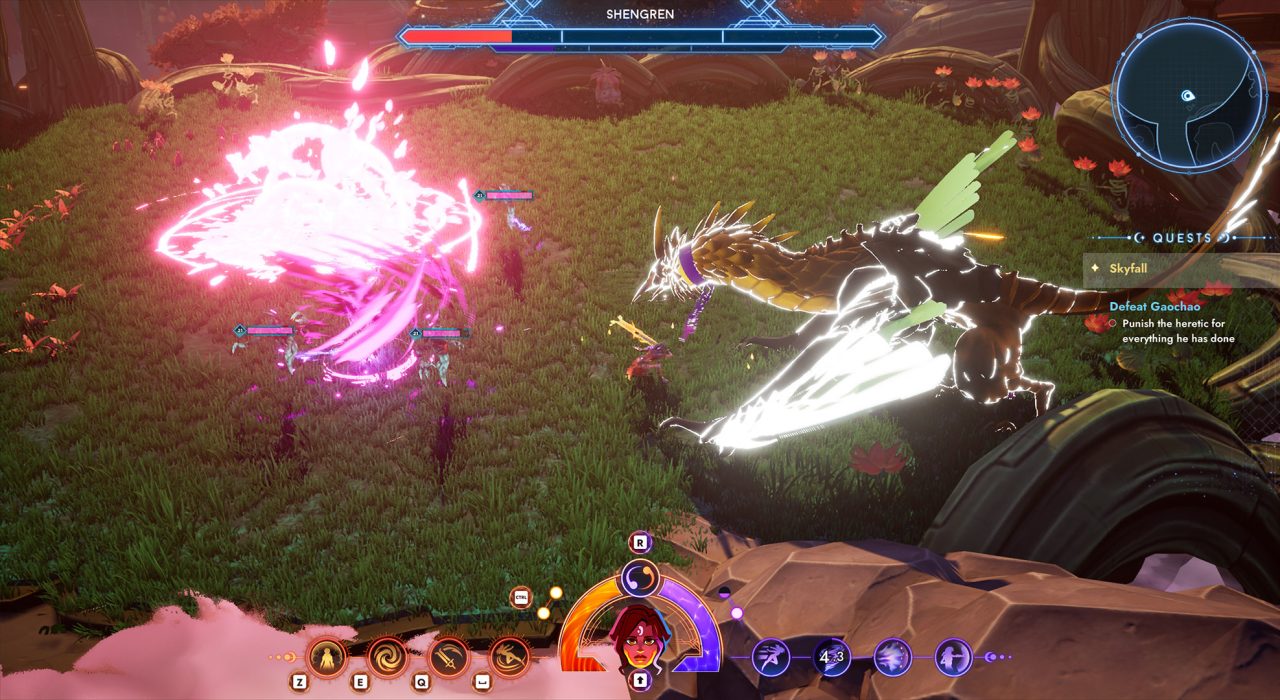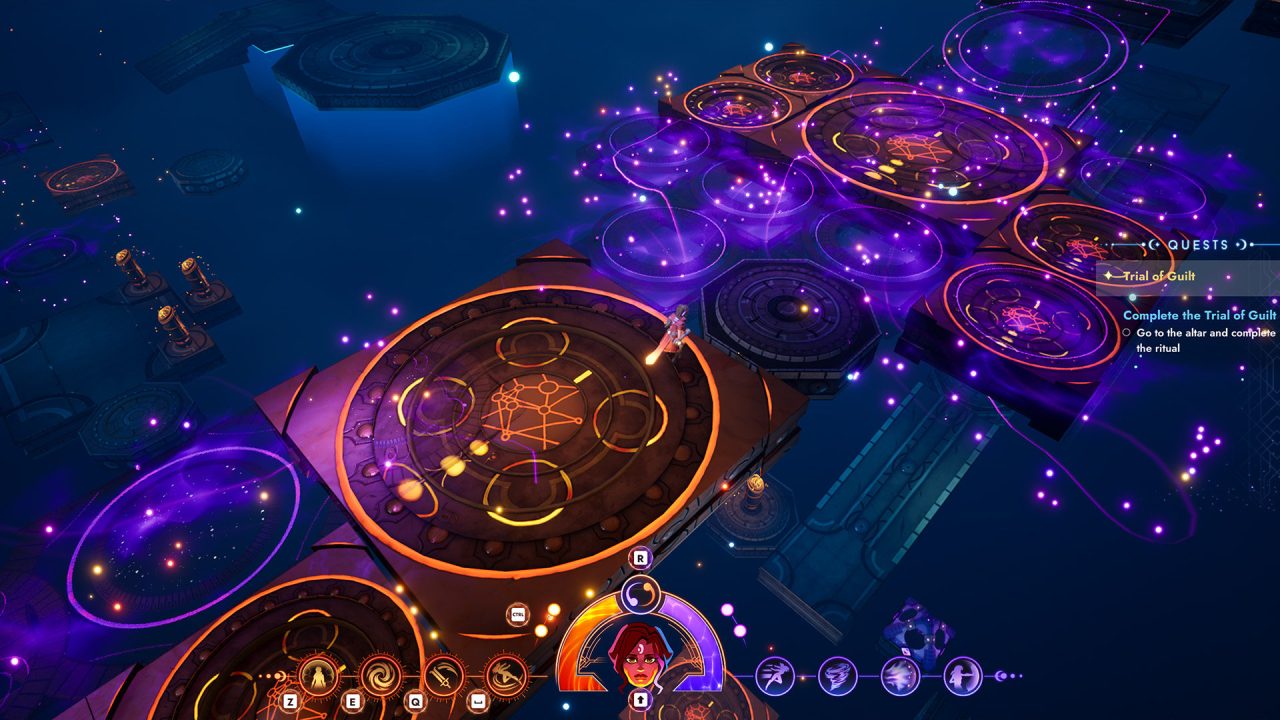Havens are sanctuaries that offer a sense of rest and peace for those who find them. In Batora: Lost Haven, any sense of refuge found on Earth has been wiped out after a cataclysmic event destroyed half the planet and took countless lives. Teenage survivors Avril and Mila explore what is left of London at the start of the tale when Avril is goaded into action by mysterious voices urging her forward while her more cautious friend tags along to ensure she doesn’t get in over her head. The voices belong to a duo of guardian gods for Earth called Sun and Moon, who inform the impulsive Avril that she is now their chosen champion before whisking her and Mila away to alien worlds. Her mission is to absorb the planetary Cores of each strange new planet she encounters to restore the gods to their physical forms, fixing the damage done to Earth. But as she and Mila traverse the worlds, she soon discovers that what she thinks is an easy task to save everyone might not be so clear-cut and that Sun and Moon may not be the benevolent gods they make themselves to be. With each planet, Avril stands at crossroads and decision points with no easy answers. What she chooses to do could very well impact the entire universe.
Batora: Lost Haven is an action RPG of intergalactic proportions. You-as-Avril only stay in the burning remnants of London long enough to learn the basics of travel between scenes before being thrown into the thick of combat to learn the ropes, with each progressive early encounter adding nuance to the overall battle mechanics. As Sun and Moon’s champion, Avril acquires dual Natures that you can switch between with a simple button press. Physical Nature is Sun’s domain and sees you entering into frenetic melee combat with a rather impressive sword, while Moon presides over the projectile-lobbing long-distance Mental Nature. Both Natures have separate health meters and different play styles, with unique moves only available when taking on that particular form.

Enemies have a Nature assigned to them too, and you’ll deal more damage to a foe if you attack them with a strike from their exact Nature. For example, Mental-focused enemies take more damage from Mental attacks. In addition, some unique Hybrid enemies have health bars for both Natures, and you must whittle down each one with the correct corresponding attack type to conquer them. Defeating enemies awards you experience points, which in turn helps you level up and increase Avril’s overall stats.
Avril gains strength not only by leveling up but by equipping many Runes to her person. Runes provide beneficial stat bonuses and practical passive skills, such as boosting the damage of a special attack like Solar Wind and increasing the healing potency of orbs you collect from defeated enemies or by destroying crystals out on the field. For you Final Fantasy VII fans out there, you can think of them as a sort of Materia system. You gain specific types of Rune Points (Defender, Neutral, and Conqueror) through decisions you make and upon leveling up. Each Rune requires a certain proportion of points before equipping, so picking the most beneficial Runes for your playstyle and swapping out Runes as needed when you have enough points adds a fun, strategic layer to status and skill boosting.
Avril and Mila visit different worlds populated by hostile creatures and friendlier residents, some of whom even become temporary allies. Next, you travel to more hospitable terrain and settlements, listening to NPC chatter and perusing shops to buy and sell valuable items before heading out into the harsher grounds again. There is an easily marked quest line to accomplish, and you move on to the next only once you’ve completed the current task. Your ultimate goal with each world is to reach its Core, but there is a sequence of steps you must take before then that help flesh out each alien landscape and their respective cultures.

Batora: Lost Haven boasts heavy decision-making moments throughout its run and a Karma Alignment system that coincides with those moments. You have a narrative choice of how to proceed next while playing. There are no right or wrong decisions, and the outcome of any player choice will be a mixed bag at best to fit with the more ambiguous and realistic plot undertones. For instance, saving a character in one scene could end up dooming another shortly after. More aggressive responses tend to net you Conqueror points, while more mindful answers earn you Defender points. Where you fall overall on the Karma Alignment scale by the end of the game alters the ending. However, completing the game once and saving that data will open up a New Game+ mode, allowing you to see how different decisions affect the plot. I give Batora credit for truly embracing the idea of there being no easy, clear-cut “obviously right or wrong” answers to its scenarios, especially given how the story ultimately evolves. Duality plays a considerable role throughout, so it only makes sense it exists in the game’s choice-making elements too!
Aside from Batora’s story scenes and hectic fights, there are puzzles aplenty to test your brain power. Puzzle areas are vast expanses that Avril must make her way across using platforms and switches she can activate using abilities from her Natures. However, I found these puzzle sections to be a welcome and enjoyable reprieve when they did show up, offering you a chance to flex your creativity and problem-solving skills.
Batora: Lost Haven is a solid experience from a gameplay stance and storytelling angle, one that I grew to enjoy immensely and appreciate the more I played. But that isn’t to say it doesn’t have some design flaws. Combat is indeed fast and fluid, and I love the idea of switching between Physical and Mental Natures; however, the process itself could have used a bit of fine-tuning and smoothing out. While each Nature has unique moves, the buttons to initiate them are the same, so one could see Avril’s existing repertoire as being somewhat limited. The separate health meters are also a mixed bag, as you must keep an eye on both of them constantly; it only takes one getting wiped out to result in an automatic game over, regardless of how full the other is. Since you’re often being attacked by swarms of enemies, getting hit by specific Nature attacks is just a matter of time, regardless of which one you’re actively using. Letting you keep going until both meters are depleted would’ve avoided a lot of unnecessary frustration when playing. Temporary allies are also more problematic than helpful since their getting knocked out results in a game over. You must constantly ensure they aren’t being swarmed by enemies, even while trying to attack and defend yourself.

Boss fights are large, staged affairs where you fight a three-pronged battle against a powerful foe who only grows stronger the more you permanently whittle away their health. It takes some time to formulate strategies for many of them, as they also have dual Nature health meters to contend with, and, unlike Avril, you have to take out both of their health meters for them to go down. I lost count of how often I had to retry these powerhouse duels.
This retrying point leads me to Batora’s biggest weakness: oddly enough, its peculiarly frustrating save system. The game auto-saves at specific moments and lets you to continue automatically from the last save point should you get a game over. It also allows you to save manually, though these manual saves will revert to your previous auto-save. Even if you advance past that auto-save point and manually save but have to stop playing for whatever reason, the next time you load the “manual” save, you’ll go back to your last auto-save instead. You will then lose any potential progress you might have made beforehand. It was a head-scratcher for me when I realized what was happening, so I got into the habit of constantly advancing to the next auto-save before stopping, sometimes even stopping right before boss fights. Because some of the auto-saves could be quite far from one another, there’s the added frustration of starting whole areas and quests from the beginning, even if you’ve manually saved at the halfway point. By eliminating the manual save entirely and having the game auto-save more regularly, Batora could’ve avoided quite a few headaches.
Batora: Lost Haven has a gorgeous visual presentation, even if the graphics are meager. I liked how creatively the developers got around this issue by using distant camera angles where they could, as well as a distinctive color scheme. Despite having a fixed camera, Batora lets you zoom in should you want a slightly closer view. The beautiful visual-novel-style portraits used during most story sequences are expressive and detailed. I adored how visually varied and detailed all alien lifeforms and worlds are. The English voice acting is decent for the most part, with the voice actors for Avril and Mila, in particular, emoting wonderfully as the plot becomes more intense and gut-wrenching. Special mention must go to the stunning and powerful soundtrack permeating the game. I was in awe of several of the battle tracks and just how vibrant a soundscape this sci-fi journey has. You can even take an in-depth look at Batora’s evocative OST with this deep-dive video to get more of a feeling for the music.

Batora’s story also struck me. Not only is the plot’s decision-making element handled brilliantly but so are its central themes of love, hope even amidst despair, and free will. The planets that Avril and Mila visit are homes to wonderfully explored, fully fleshed out, and incredibly diverse cultures. As you go, the looming mystery behind the disaster that affected Earth builds steadily. Characters are all realistic and believable, with reactions to everything that shows them at their best and worst, depending on your point of view.
Standing at the center of this soul-searching tale is Avril herself. I was put off at first by her more reckless and impulsive personality, but she is a character with incredible hidden depth. The more the game explored her mindset by delving into her past and showing how increasingly devastated Avril became with each new and tough decision she had to make, the more I saw her as who she indeed was. Avril is someone who has endured much far too soon and still had to grow into her own through her journey. Every decision I made further fleshed her out, seeming like a logical choice she’d make in her attempts to make things better in the long run, regardless of what side of the alignment system they fell on. The ending scenes showcased her phenomenal character growth in a touching and moving way. In so many respects, her journey is the heart and soul of Batora, making the title’s plot stand out all the more.
Batora: Lost Haven isn’t a perfect game, but it is one I’m ultimately glad exists. Like Avril, the title grows on you if you give it a chance. There’s no denying that the game has some hurdles from time to time while playing, and they’ll undoubtedly take a while to get past. Still, that sense of accomplishment after overcoming them is addicting in itself, which might make Batora’s challenges all the more enticing.


